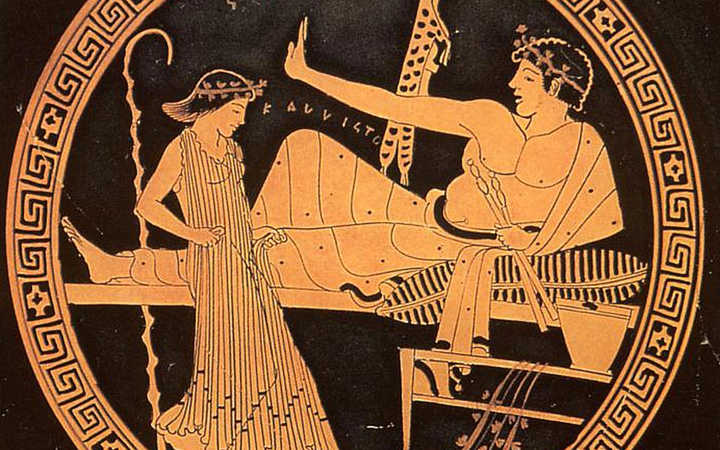Greek Hospitality is Hard-Wired Into the Culture
It is a well-known fact that Greece is one of most hospitable places you’ll ever visit. Go to a restaurant, eat your fill, and more often than not you’ll be presented with a complementary dessert at the end of your meal. It might be fruit, or it might be ice cream and a small piece of cake, but this is a common tradition in Greek restaurants. And a tip of any amount, even a two-euro coin for a fifty euro meal, is received with gratitude.
Meet someone on the street whilst asking for directions, and there is a real possibility that he’ll invite you to his home for an aperitif. Go to a Greek home as a guest for a meal, and the entire family will wait for you to choose the best cut of meat, after which you’ll be waited on hand and foot. Stay at a Greek home for a day or two, and you’ll be treated like royalty, with fresh linens every day, wonderful meals, quality time, and even a tour of the locale. Spend a few days in a village and you’re likely to hear a knock at your door and open it to a local with a basket of fresh veg or fruit, a freshly-baked spanikopita (spinach pie), or a warm loaf of bread.
Hospitality is one of the most charming aspects of Greek culture. To a Greek, no one is a foreigner. And if you have an interesting story to tell, you’ve made a friend for life.
But where did this attitude come from? Part of it is an accident of geography. Greece is a crossroads between east and west. For thousands of years traders, sailors, and travelers have crossed its borders, traversed its waterways, sold and bought goods, and toured its islands and ancient cities. These travelers of all stripes needed a place to stay in an age where the concept of a hotel was yet to be born.
Another reason that this tradition took root was the itinerant facet of ancient Greek culture, which involved frequent travel for feasts and trade, and, sometimes, the need to host political exiles. Often these travelers, as Blanche DuBois did in A Streetcar Named Desire, often depended “upon the kindness of strangers.”
Greek mythology taught Greeks from ancient times that it is civilized and honourable to treat guests favorably. You never knew who your guest might be. Homer’s famous dictum, “The gods visit us disguised as strangers” applies here.
Another name for Zeus was Zeus Xenios, in which the god was considered the embodiment of hospitality. His consort, Hestia, goddess of hearth and home, was also considered a partaker in this custom. Hermes, as well, as will be shown, assisted Zeus in his protection of travelers and in his oversight of hospitality.
A prime example of this is the myth of Baucis and Philemon, who were a pair of old, poor peasants in a village which was visited by Zeus and Hermes. The gods had gone through the village seeking shelter for the night, and were turned away by all until they came to the old couple’s cottage, where they were hosted and treated well. In return, the gods turned the rustic cottage of Baucis and Philemon into a beautiful temple, whilst destroying the rest of the village and appointing the old couple as the temple’s guardians.
In another story, out of the Odyssey, the goddess Athena came to the home of Telemachus disguised as Mentes, Odysseus’ old friend. Telemachus greeted Mentes/Athena warmly with the words “Hail, stranger, in our house thou shalt find entertainment and then, when thou hast tasted food, thou shalt tell of what thou hast need,” and was rewarded commensurately.
Hospitality was thus considered a sacred duty, and a potential opportunity to pass a test organized by a deity. Homer mentions eighteen instances of hospitality in his writings, often contrasting good hospitality and its attendant rewards, with bad hospitality and its negative results. His most famous tale of hospitality gone wrong was when Paris of Troy, whilst a guest at the palace of Menelaus , king of Sparta, thanked his host by stealing his wife, triggering the Trojan war.
To be sure, hospitality is a feature of many Middle Eastern and Mediterranean cultures. Hospitality to the stranger is codified in Mosaic Law in the Old Testament, wherein the God of the Hebrews admonishes His people to practice hospitality, reminding them in Leviticus 19:34 and elsewhere of their years wandering in the desert with the words, “for you were strangers in a strange land.”
Philoxenia is also frequently found in hotels and resorts in Greece. Just look at some of the reviews of various resorts in the country and you’ll find, as the most frequently mentioned positive, a mention of “the very friendly and helpful staff,” or words to that effect.
While we’re on the subject, we encourage you to make use of the Grecomap guide for all of your holiday needs.
Within the Grecomap guide, you will be able to find great suggestions for things to see and places to go, including archeological sites, museums, beaches, outdoor activities, and lots more. You’ll have access to unique discounts at our carefully curated hotels and resorts, fine dining experiences, as well as guides to the immediate area, when you book directly from Grecomap.












